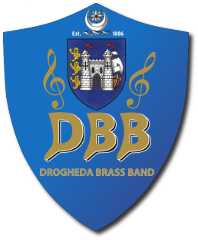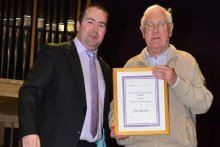Joe Sheils (RIP)
Joe Sheils began his banding career learning the trombone in the Drogheda Brass & Reed Band.
During the mid-1950s, a combination of need for new instruments and lack of funds almost put the band out of existence, and Joe decided to forego his musical ambitions to concentrate on committee work.
Along with leading townspeople, an External Instrument Fund Committee was formed, which successfully fundraised over a number of years and the band was saved from extinction.
Joe served as non-playing band secretary for many years before becoming chairman and band president. During this time, he led the committee and band through many significant events too numerous to name, but including:
- the change from brass & reed to brass band in 1964, becoming the Drogheda Brass Band;
- adoption of a new constitution in the 1970s giving control of running the band to the playing members – prior to this the aforementioned external committee had effective control;
- two band trips to the USA (Des Moines, Iowa in 1977 and Oklahoma City in 1979) as part of the President Carter Friendship Force programme;
- the establishment of our current School of Music in 1981 and the introduction to Irish brass bands of grade exams for band instruments (commonplace now but radical at the time);
- the purchase from Drogheda Corporation of our bandrooms in Georges Street in the mid-1980s, which paved the way for its later sale and purchase of our current premises.
He also oversaw the appointment in the early 1990s of Mickey Maher as conductor (contrary to conventional wisdom which favoured an external appointment) – Joe insisted Mickey was the right choice and, of course, time proved him absolutely correct, as Mickey went on to lead the band through the most successful period in its history.
He was the last surviving founder of our band association the IABCB and served as general secretary and chairman of the executive council, as well as secretary and chairman of the NE Region Committee. Among his achievements in these roles were the establishment of the National Band Championships; the National Broadcasting Bands in conjunction with RTE; the NE Region Summer School in Gormanston College; and regional solo/quartet/ensemble competitions.
Against the backdrop of The Troubles, he ventured north of the border and established links with the NIBA, leading to the current friendly IABCB/NIBA relationship with bands from both associations being allowed compete in each other’s competitions – another radical development we take for granted today.
In his later years, he joined his wife Gillian’s band, St George’s Brass Band of Dublin (she is of course also a former Drogheda Brass Band member), and learned to play Eb bass. It was entirely fitting that having forgone his own playing career at a relatively early age so that others might enjoy theirs, he finally (in his 80s) realised his lifelong ambition to play in a band. In typical fashion, he became involved in the St George’s committee and ended his career as their chairman, finally retiring from banding recently in his 95th year.
Joe’s contribution to Irish banding, particularly as an administrator and advocate, is simply without equal. His passing truly marks the end of an era. RIP.
- by Michael Plunkett


